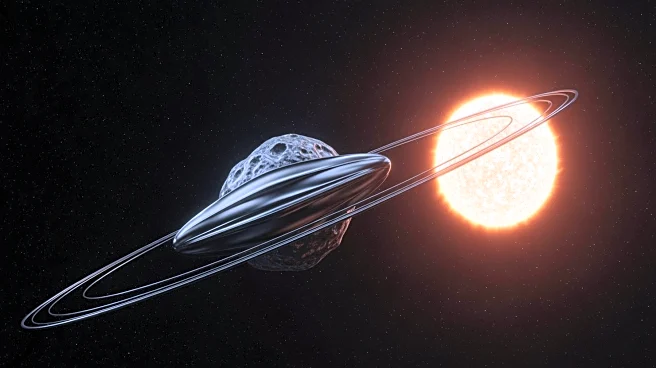What's Happening?
Carnegie Science astronomer Scott S. Sheppard has discovered an asteroid, designated 2025 SC79, which possesses the second-fastest orbit in the solar system. This asteroid completes its orbit around the sun in just 128 days, crossing Mercury's orbit in the process.
The discovery was made on September 27, 2025, and confirmed using the National Science Foundation's Gemini telescope and Carnegie Science's Magellan telescopes. The asteroid, approximately 2,300 feet in diameter, is notable for its orbit inside Venus, making it only the second such object identified. The fastest asteroid, also discovered by Sheppard in 2021, orbits the sun in 113 days. Currently, 2025 SC79 is traveling behind the sun, rendering it invisible to telescopes for several months. Further research is required to understand its composition, survival in proximity to the sun, and origin.
Why It's Important?
The discovery of 2025 SC79 is significant due to the potential threat posed by asteroids with orbits close to the sun. These 'twilight' asteroids are difficult to detect because they can only be observed during twilight hours. If such asteroids approach Earth, they could pose serious impact hazards. Understanding the trajectories and origins of these asteroids is crucial for planetary defense and offers insights into the history of the solar system. The research highlights the importance of monitoring asteroids that may not be easily visible, as they could have significant implications for Earth's safety.
What's Next?
As 2025 SC79 is currently behind the sun, astronomers will have to wait several months before it becomes visible again for further observation. Future studies will focus on its composition and how it withstands the sun's intense heat. Researchers aim to understand the asteroid's origin and trajectory, which could provide valuable information for protecting Earth from potential asteroid impacts. Continued advancements in telescope technology and observation techniques will be essential in tracking and studying such asteroids.
Beyond the Headlines
The discovery of asteroids like 2025 SC79 underscores the need for improved detection methods for celestial objects that are difficult to observe. The study of these asteroids not only aids in planetary defense but also enriches our understanding of the solar system's formation and evolution. Ethical considerations arise in the allocation of resources for asteroid detection and the potential consequences of failing to identify hazardous objects in time.















